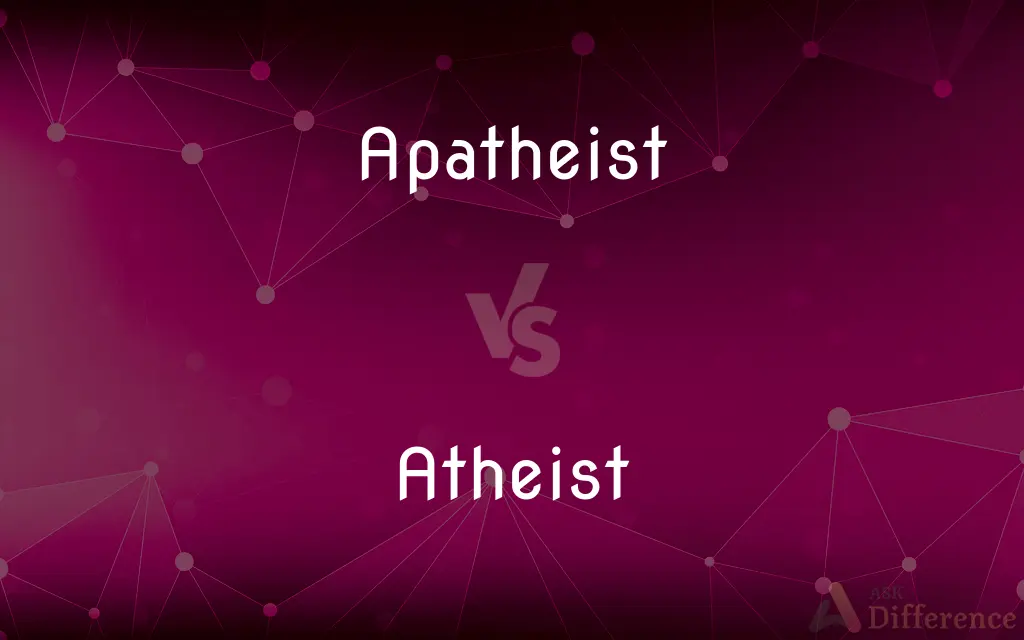Apatheist vs. Atheist — What's the Difference?
By Tayyaba Rehman & Urooj Arif — Updated on April 24, 2024
Apatheist refers to someone indifferent to the existence of gods, focusing on irrelevance to daily life; atheist denies the existence of gods, emphasizing disbelief.

Difference Between Apatheist and Atheist
Table of Contents
ADVERTISEMENT
Key Differences
Apatheists are characterized by their indifference to the question of god's existence, seeing it as irrelevant to daily life, whereas atheists actively deny the existence of gods, grounding their identity in non-belief.
Apatheists may live in a way that is agnostic to religious concerns, focusing on secular and practical aspects of life, while atheists often engage in discussions and debates about the non-existence of deities, sometimes defending their stance.
Apatheism doesn't necessarily reject religious ideas but sidelines them as unimportant, on the other hand, atheism often confronts religious beliefs directly, challenging the validity of theistic claims.
For apatheists, religious discussions may hold little interest or impact on their personal or ethical decisions, whereas for atheists, such discussions can be central to their worldview and moral reasoning.
Apatheists may participate in religious traditions for cultural or familial reasons without personal investment in the religious aspects, whereas atheists might avoid religious participation to maintain consistency with their beliefs.
ADVERTISEMENT
Comparison Chart
Belief in God
Indifferent; does not consider it relevant
Does not believe in the existence of gods
Engagement
Minimal to none in religious debates
Often engages in debates about god's existence
Basis of Stance
Practicality and irrelevance to daily life
Intellectual and evidential reasons
Participation in Religion
May participate for cultural reasons
Generally avoids religious participation
Impact on Lifestyle
Religion has little to no impact
Often motivated by secularism
Compare with Definitions
Apatheist
Someone who is indifferent to the existence of gods.
Despite her family's strong religious ties, she remains an apatheist.
Atheist
Typically avoids participating in religious ceremonies.
She avoids religious gatherings due to her atheist beliefs.
Apatheist
Views religious belief as irrelevant to personal life.
He considers debates about gods as distractions, reflecting his apatheist views.
Atheist
Often skeptical about religious claims.
As an atheist, she critically examines any religious arguments presented to her.
Apatheist
Avoids engaging in debates about the existence of gods.
As an apatheist, she seldom participates in theological discussions.
Atheist
Firmly denies the existence of any gods.
He identifies as an atheist and openly discusses his disbelief.
Apatheist
Focuses on practical and material aspects of life over spiritual beliefs.
Her apatheist perspective keeps her focused on earthly concerns rather than spiritual ones.
Atheist
Frequently engages in debates concerning religious beliefs.
Known for his atheist standpoint, he often debates religious topics.
Apatheist
May engage in religious activities for social or cultural reasons.
He attends church weddings as an apatheist, enjoying the traditions without religious commitment.
Atheist
Emphasizes a lifestyle free from religious influence.
They promote a secular approach in public education, aligning with their atheist beliefs.
Apatheist
(religion) A person who does not care about the existence of a God or gods; a supporter of apatheism.
Atheist
Disbelief in or denial of the existence of God or gods.
Atheist
(religion) A person who does not believe in deities.
Atheist
(narrowly) A person who believes that no deities exist one who has no other religious belief.
Atheist
(broadly) A person who rejects belief that any deities exist (whether or not that person believes that deities do not exist).
Atheist
(loosely) A person who has no belief in any deities, such as a person who has no concept of deities.
Atheist
(uncommon) A person who does not believe in a particular deity (or any deity in a particular pantheon), notwithstanding that they may believe in another deity.
Atheist
(proscribed) A person who does not believe in any religion (not even a religion without gods)
Atheist
Of or relating to atheists or atheism; atheistic.
Atheist
To make someone an atheist.
Atheist
One who disbelieves or denies the existence of a God, or supreme intelligent Being.
Atheist
A godless person.
Atheist
Someone who denies the existence of god
Atheist
Related to or characterized by or given to atheism;
Atheist leanings
Common Curiosities
Is apatheism the same as atheism?
No, apatheism deals with indifference to the existence of gods, while atheism involves active disbelief.
How does an atheist view god?
An atheist denies the existence of gods, often supporting their view with rational and scientific arguments.
Can someone be both apatheist and atheist?
It's possible for someone to be both, not caring about god’s existence (apatheist) and disbelieving in gods (atheist).
What defines an apatheist?
An apatheist is someone who finds the existence of gods irrelevant and generally remains indifferent to religious debates.
Can an apatheist participate in religious activities?
Yes, apatheists may participate in religious activities for cultural or familial reasons, not due to personal religious beliefs.
What motivates an atheist's disbelief in gods?
Atheists are often motivated by a lack of evidence for gods and logical inconsistencies in religious texts.
How do family and culture influence an apatheist?
Family and cultural backgrounds can lead apatheists to participate in religious traditions without personal belief.
Why might an atheist avoid religious ceremonies?
Atheists often avoid religious ceremonies to stay consistent with their disbelief in gods and religious doctrines.
How does apatheism affect daily life?
Apatheism typically leads to a focus on secular and practical life aspects, with little concern for religious or spiritual matters.
What role does skepticism play in atheism?
Skepticism is central to atheism, as it involves questioning and often rejecting religious claims.
What is a common misconception about apatheists?
A common misconception is that apatheists are covert atheists; however, apatheism specifically involves indifference, not disbelief.
Do apatheists argue about religion?
Generally, apatheists do not engage in religious arguments, seeing them as irrelevant.
Are atheists likely to be secular activists?
Many atheists advocate for secularism in public policies and education, reflecting their beliefs.
Does apatheism require knowledge of religious concepts?
Apatheism does not necessarily require deep knowledge of religious concepts, focusing instead on their irrelevance.
How do atheists handle religious discussions?
Atheists often engage actively in religious discussions, presenting counterarguments to religious claims.
Share Your Discovery

Previous Comparison
Offend vs. Offense
Next Comparison
Irrational vs. ArationalAuthor Spotlight
Written by
Tayyaba RehmanTayyaba Rehman is a distinguished writer, currently serving as a primary contributor to askdifference.com. As a researcher in semantics and etymology, Tayyaba's passion for the complexity of languages and their distinctions has found a perfect home on the platform. Tayyaba delves into the intricacies of language, distinguishing between commonly confused words and phrases, thereby providing clarity for readers worldwide.
Co-written by
Urooj ArifUrooj is a skilled content writer at Ask Difference, known for her exceptional ability to simplify complex topics into engaging and informative content. With a passion for research and a flair for clear, concise writing, she consistently delivers articles that resonate with our diverse audience.














































